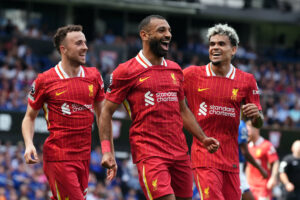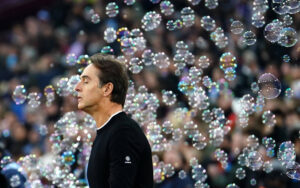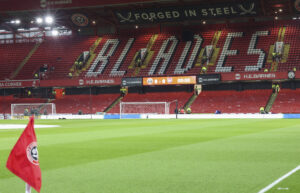Now that Unai Emery has been appointed as his successor and the Arsène Wenger era at Arsenal is officially over, the all-important historical question can be asked: where does Wenger rank in the pantheon of Arsenal Managers? Well, despite all the eulogies made to him in his last month or so in charge, he is not the greatest Arsenal boss ever. And although there may not be a prize for guessing who beats Wenger to that title, the fact that such major figures as Bertie Mee (who oversaw the Double win in 1971) do not even make the list shows how tough the competition is.
Here then are Arsenal’s five greatest managers, in reverse order.
Arsène Wenger’s Rank Amongst Arsenal Managers
5. Tom Whittaker (Manager from 1947 to 1956)
Major achievements: two league titles (1948 and 1953) and one FA Cup (1950)
Whittaker was the man who maintained Arsenal’s position at the top of the English game after World War Two. He had played for the club in the pre-Herbert Chapman era until he broke a kneecap. At this point, he became the first-team trainer and physiotherapist under Chapman. He is said to have effected an improvement in training methods and preparation for games. One that was comparable to that achieved by Wenger when he first took over Arsenal. When Chapman died in 1934, Whittaker effectively became assistant manager under George Allison. Then, when Allison retired in 1947, Whittaker became manager. This established the kind of managerial continuity that would not be seen again in English football until Liverpool’s fabled ‘boot room’ of the 1970s and 1980s.
Another comparison with Wenger is that Whittaker won the league in his first season in charge. He then won the FA Cup in 1950 and another League title in 1953. The star of Whittaker’s team was undoubtedly Scotsman Jimmy Logie. He was an inside forward whose domination of games earned comparisons with Arsenal’s original great Scot, Alex James.
Eventually, Whittaker would become the second manager of Arsenal to die while in the job, after Chapman. With his death, the long unbroken link to the Chapman era was finally over. It would take Arsenal more than a decade to establish a new identity and start winning again, with Bertie Mee’s Uefa Cup-winning and Double-winning team of the early 1970s.
4. George Allison (Manager from 1934 to 1947)
Major achievements: two league titles (1935 and 1938) and one FA Cup (1936)
George Allison was the manager of Arsenal for 13 years. Unfortunately for him, it was an unlucky 13; the second half of his managerial career was spent during World War Two, when the club, like all English clubs at the time, was reduced to playing relatively meaningless exhibition matches that are not officially considered as part of English football history. And even when the war ended, Allison struggled to adjust to the new footballing order that had emerged. This came with the rise of the two teams that would eventually surpass Arsenal’s title-winning achievements in England; Manchester United and Liverpool.
Before the war, though, Allison almost seamlessly maintained the dominance that Herbert Chapman had established. He oversaw the third of three successive titles for Arsenal in 1935 and winning another title for good measure in 1938, as well as the 1936 FA Cup. The star of his great late 30’s side was Ted Drake, the superb centre-forward who once scored seven goals in a single league game against Aston Villa, a record that still stands.
The only shame was that Drake was allowed to leave the club in 1945 to embark on his managerial career. He should surely have been retained and groomed as Tom Whittaker’s successor. Instead, Drake became Chelsea manager and ‘Drake’s Ducklings’ won the league in 1955. This was Chelsea’s only league title win before Roman Abramovich took over nearly half a century later.
3. George Graham (Manager from 1986 to 1995)
Major achievements: two league titles (1989 and 1991), one FA Cup (1993) and one European Cup Winners’ Cup (1994)
The ignominy of George Graham’s departure from Arsenal early in 1995, after he had been found guilty of taking a ‘bung’ (or illegal payment) as part of a transfer deal, should not be allowed to overshadow the enormous achievements of his near-10 years in charge, especially those of the first five years.
After ending an eight-year trophy drought for the club by winning the League Cup in his first season in charge, Graham went on to win much bigger and more glittery silverware. His standout achievement, of course, was to win the league title at Anfield in 1989. Although Liverpool and their fans were still undeniably in a state of shock after the appalling events of Hillsborough just over a month earlier, Liverpool were still the reigning champions and FA Cup holders (having won the cup before the rearranged final league game with Arsenal was played), and to beat them by two goals at home remains probably the single greatest achievement in Arsenal’s history, ahead – just – of the Invincibles season of 2004.
Graham won another title in 1991 and the FA Cup and European Cup Winners’ Cup in 1993 and 1994. Appropriately, given his emphasis on the importance of defence, the greatest player of his time at Arsenal was Tony Adams, the centre-back, captain and leader of arguably the finest post-war back four in English club football.
2. Arsène Wenger (Manager from 1996 to 2018)
Major achievements: three league titles (1998, 2002 and 2004) and seven FA Cup wins (1998, 2002, 2003, 2005, 2014, 2015 and 2017)
Now that his time in charge of Arsenal is finally over, it can be said with some certainty that Arsène Wenger is Arsenal’s second-greatest manager ever. If only he had been able to build on the achievements of his first decade in charge at Arsenal and in particular win the elusive European Cup/Champions League that has become the club’s Holy Grail, he would undoubtedly have come top of the pile. Unfortunately, of course, he could not do so and instead only oversaw the three FA Cup wins at the end of his time in charge, which made him the ‘winningest’ manager in the history of the cup.
Nevertheless, Wenger’s unique achievement in his first ten years at Arsenal, during which time he won three League titles and four FA Cups (including two league and cup doubles), was to play not only winning football but attractive winning football. For probably the first time in Arsenal’s history, they were no longer derided as ‘boring, boring’ Arsenal. Instead, they became ‘scoring, scoring’ Arsenal. As a result, they became most neutrals’ second team. Especially, because they were the only realistic domestic challengers to Manchester United for Wenger’s first eight years in charge.
The greatest player of this era was striker Thierry Henry. For about three years – between 2003 and 2006 – he was probably the best player in the world. That was the first time since the 1930s that an Arsenal player could lay claim to that title.
1. Herbert Chapman (Manager from 1925 to 1934)
Major achievements: two league titles (1931 and 1933) and one FA Cup (1930)
On the surface, it might appear that Wenger deserves to be ranked as the greatest Arsenal manager ever. And on the surface, it might appear that Herbert Chapman was only as good a manager as his two successors. George Allison and Tom Whittaker had identical major achievements. But all that only goes to show that appearances can be utterly deceptive.
Herbert Chapman was so influential as a football manager that it is astonishing a biopic was never made about him. The cinematic reference is appropriate. It is often said that what Frank Capra achieved as a film director, Chapman achieved as a football manager. That is to say that Chapman virtually created the position of football manager; just as Capra virtually created the position of a film director. Chapman built a dominant side with the genius Alex James as its fulcrum.
However, many of his achievements were intangible: transforming Arsenal from big-city also-rans to the best team in England; renaming the local tube station ‘The Arsenal’, like the club; campaigning for floodlit and European football 20 years before they were actually introduced; and, most importantly, establishing Arsenal as the world’s first world-famous club, and the model for all the so-called ‘super clubs’ that have come afterwards.
Ultimately, the reason that Herbert Chapman remains Arsenal’s greatest ever manager and will probably retain that title for all time is that he is the man who built the club. Even if Arsène Wenger rebuilt the club in his own image, Chapman had built it in the first place in his own image. That is why Sir Matt Busby will always rank ahead of Sir Alex Ferguson; why Bill Shankly remains even more revered than Bob Paisley. It’s why Herbert Chapman just edges Arsène Wenger as the all-time greatest Arsenal manager.
Main Photo






